|
|
|
Sort Order |
|
|
|
Items / Page
|
|
|
|
|
|
|
| Srl | Item |
| 1 |
ID:
170264
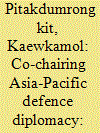

|
|
|
|
|
| Summary/Abstract |
This article assesses co-chairs’ roles in affecting the outcomes of Asia-Pacific defence diplomacy, which have been under-examined. Attempting to mend this intellectual gap, our study examines: ‘What shapes specific agreement details?’ We contend that co-chairs’ effectiveness is not borne out of resource possession but in fact derived from their ability to manage the resources. In order to be effective, co-chairpersons must convert the available resources at hands into bargaining leverage. To validate our argument, empirical analysis of military medicine (MM) collaboration under the ASEAN Defence Ministers’ Meeting Plus (ADMM-Plus) framework was conducted. We demonstrate how the Thai and Russian co-chairs altered the bargaining dynamics to shape the outcomes regarding the ASEAN Center of Military Medicine (ACMM). Insights from our analysis not only extends the existing academic literature on Asia-Pacific defence diplomacy and international negotiation, but also provides practitioners with lessons useful for conducting defence diplomacy and enhancing security cooperation in the Asia-Pacific and beyond.
|
|
|
|
|
|
|
|
|
|
|
|
|
|
|
|
| 2 |
ID:
170257
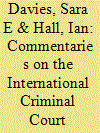

|
|
|
|
|
| Summary/Abstract |
In this Issue we are excited to share with our readers four outstanding pieces that examine the ‘for’ and ‘against’ arguments on the recent International Criminal Court decision (September 2018) to investigate and prosecute crimes against humanity committed against the Rohingya people, who fled Myanmar into Bangladesh in late August 2017.
We have published two commentaries that are in favour of the ICC decision: Victoria Colvin and Phil Orchard, University of Wollongong; Melinda Rankin, University of Queensland, and Kip Hale, Atrocity Crimes Investigations. We have also published two commentaries that adopt a (nuanced) against position on the ICC decision: Douglas Guilfoyle, UNSW Canberra at Australian Defence Force Academy (ADFA); Morten Pedersen, UNSW ADFA. These are outstanding pieces. We hope you enjoy reading them.
|
|
|
|
|
|
|
|
|
|
|
|
|
|
|
|
| 3 |
ID:
170261
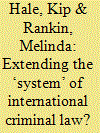

|
|
|
|
|
| Summary/Abstract |
Despite its short life of 16 years, the International Criminal Court (‘ICC’ or ‘Court’) is no stranger to controversy. Indeed, contestation started before the ICC began operations. Throughout the drafting the Rome Statue, the ICC's founding treaty, states such as Germany argued vehemently for the ICC to be granted universal jurisdiction, while the permanent five members of the United Nations Security Council (‘UNSC’ or ‘Council’) remained reticent to relinquish full jurisdiction over the core international crimes (Eikel 2018), including war crimes, crimes against humanity, and genocide (collectively ‘atrocity crimes’). Even after the Rome Statute was passed and the ICC was founded, albeit without universal jurisdiction, it remained embattled. Not only was it criticised for its ineptness at the early stages of its establishment, the Court continued to be condemned for its lack of involvement in global hotspots outside its jurisdiction. For instance, despite being described as the worst humanitarian disaster since the Second World War (Al Hussein 2017), the ICC does not have jurisdiction over alleged atrocity crimes in Syria – namely, because Syria is not a State Party to the Rome Statute, but also because Russia and China as permanent members of the UNSC have blocked attempts to refer it to the ICC.
|
|
|
|
|
|
|
|
|
|
|
|
|
|
|
|
| 4 |
ID:
170263
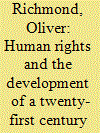

|
|
|
|
|
| Summary/Abstract |
The ‘long peace’ of the last twenty-five years has linked various forms of intervention—from development to peacebuilding and humanitarian intervention—with human rights. This ‘interventionary system/order’ model has premised its legitimate authority on expanded versions of human rights, connected to liberal frameworks of democracy, rule of law, and capitalism in order to connect peace more closely with justice. Human rights offer a tactical way forward for those interested in conflict resolution, but this has led to unintended consequences. Unless conceptions of rights are continually expanded as new power structures and inequalities are uncovered and challenged, philosophical and material matters of distributive and historical justice will remain.
|
|
|
|
|
|
|
|
|
|
|
|
|
|
|
|
| 5 |
ID:
170258


|
|
|
|
|
| Summary/Abstract |
The transfer and deportation of ethnically Rohingya people from Myanmar into Bangladesh is a crime against humanity demanding an international response. What role, however, should the International Criminal Court (ICC) play? On 6 September 2018 an ICC Pre-Trial Chamber ruled that the Court has jurisdiction to investigate and prosecute such crimes as they are completed on the territory of a State party, Bangladesh. Myanmar is not a party to ICC Statute and has invoked the principle that treaties do not bind third parties without their consent. The case put in this commentary is that while the Pre-Trial Chamber’s approach to the law was arguable as an interpretation of the ICC Statute, it was unwise as a matter of policy. The argument is threefold. First, the Pre-Trial Chamber’s ruling is as a matter of legal method only the first-move in a process of norm-creation and persuasion. Second, it does not follow that because territorial jurisdiction in international law includes ‘objective’ jurisdiction over transboundary acts completed on a State’s territory that such jurisdiction was delegated by member States to the ICC in all cases. Finally, it is argued that international criminal tribunals do not succeed when the cooperation of necessary territorial governments (here, Myanmar) is withheld. Proceeding in this case risks becoming a quagmire of the ICC’s own creation at a time when it can little afford further risks to its legitimacy.
|
|
|
|
|
|
|
|
|
|
|
|
|
|
|
|
| 6 |
ID:
170259
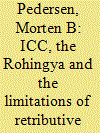

|
|
|
|
|
| Summary/Abstract |
The recent decision by the Prosecutor of the International Criminal Court (ICC), Mrs Fatou Bensouda, to launch preliminary investigations into the alleged deportation of 700,000 Rohingya Muslims from Myanmar to Bangladesh as a possible crime against humanity is part of a growing push to punish Myanmar’s military leaders for large-scale human rights violations committed during army ‘clearance operations’ in Northern Rakhine State (ICC 2018). The operations, which were launched in response to attacks by the Arakan Rohingya Salvation Army (ARSA) on some thirty government security posts on 25 August 2017, were found by international human rights organisations to have systematically targeted civilians, including mass killings, rape and the destruction of scores of villages (UNHRC 2018), thus causing the mass exodus.
|
|
|
|
|
|
|
|
|
|
|
|
|
|
|
|
| 7 |
ID:
170265
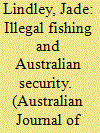

|
|
|
|
|
| Summary/Abstract |
The security impact of illegal fishing is not well understood. Where illegal fishing is recognised as a security problem, the focus has been on fish as a natural resource, the depletion of which can have impacts on food security, individual livelihoods, and the economic survival of states relying on illegal fishing. We argue that a focus on fish as a natural resource obscures the other security challenges the crime of illegal fishing poses to Australia. As this paper explains, illegal fishing overlaps with drug, human, weapon and other contraband trafficking and smuggling; irregular maritime arrivals; and maritime piracy. In addition, like other easily transported, high value resources, illegal fish can fund insurgencies and other types of political violence. Understanding illegal fishing as a security challenge will improve Australia’s national security policy. First, it acknowledges fish as a vital natural resource, implicated in economic, ecological, and human security; second, it analyses how illegal fishing interlinks with other maritime crimes; third, it challenges the effectiveness of monitoring and enforcement of illegal fishing; fourth, it presents an opportunity for effective regional cooperation; and finally it highlights the benefits of regional cooperation in responding to illegal fishing.
|
|
|
|
|
|
|
|
|
|
|
|
|
|
|
|
| 8 |
ID:
170262
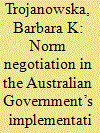

|
|
|
|
|
| Summary/Abstract |
The Australian National Action Plan on Women, Peace and Security (NAP) offers an apt example of norm negotiation in implementing United Nation Security Council Resolution 1325 (UNSCR 1325). Launched in 2012, the NAP is nearing completion due June 2019. The purpose of this article is to understand how far and in what ways the NAP has thus far supported the achievement of the transformative ambitions of the Women, Peace and Security (WPS) agenda to bring about greater gender equality for conflict-affected women. I argue that whilst this transformative agenda failed to diffuse vertically throughout the Australian NAP, this has simultaneously encouraged horizontal diffusion. That is, the sophisticated discourse on gender equality presented in the narrative part of the NAP did not translate into a robust framework for action (vertical diffusion). This failure has, however, allowed the WPS agenda to be negotiated within individual implementing agencies (horizontal diffusion). Through the juxtaposition of policy analysis with semi-structured interviews with NAP implementers, this article demonstrates that the lack of precision around the implementation strategy has—paradoxically—resulted in significant policy development on UNSCR 1325. Simultaneously, it has led to untargeted implementation, ultimately constraining the possibilities for meaningful impact on the ground.
|
|
|
|
|
|
|
|
|
|
|
|
|
|
|
|
| 9 |
ID:
170260


|
|
|
|
|
| Summary/Abstract |
The International Criminal Court Pre-Trial Chamber’s decision that the Rohingya situation falls within the Rome Statute and can therefore be investigated by the Prosecutor may – on the face of it – not appear to be a significant milestone in achieving accountability against the government of Myanmar and its military, the Tatmadaw. While the Prosecutor has now confirmed that a preliminary examination will be opened examining the deportation of the Rohingya (International Criminal Court 2018c), this will be a slow process. The likelihood of any member of the Myanmar government actually being tried and convicted is low. We suggest, however, that its effects will be broader than just the Rohingya situation for two reasons. The first is that it in effect creates a new referral mechanism for situations of forced deportation. The second is because it helps to both clarify and highlight the international crimes of forced deportation and forcible transfer, which may lead to their prosecution on a more routine basis.
|
|
|
|
|
|
|
|
|
|
|
|
|
|
|
|
|
|
|
|
|